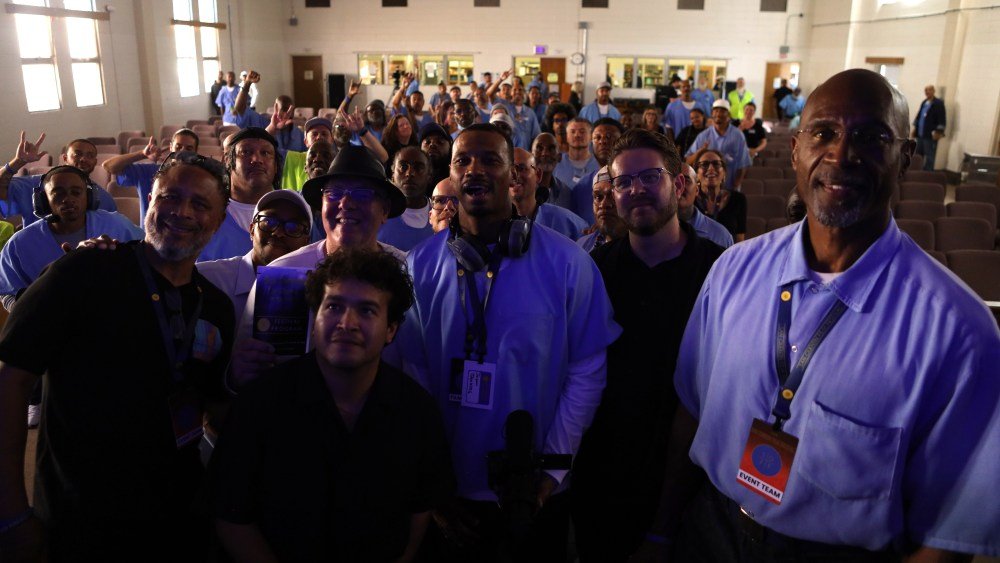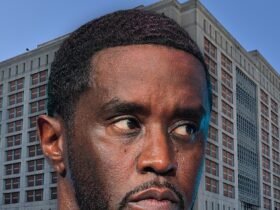Samuel L. Jackson is sitting at the edge of a fountain in the center of a beautiful courtyard. A few feet away from us, there’s an ensemble of violinists and guitarists and drummers playing music from all over the world. Jackson is here, he tells me, for asking people, “What’s in your wallet?”
Samuel L. Jackson and I in the courtyard of the San Quentin Rehabilitation Center.
Phil Bray for San Quentin FIlm Festival
But no, he’s not taping a Capital One commercial. I should mention that his middle initial stands for Lamont, not Leroy — this isn’t the “Pulp Fiction” actor. We’re at the oldest prison in the state of California attending the San Quentin Film Festival: the world’s first event of its kind, meant to put a spotlight on creative work produced by people like Sam, who has been incarcerated for 28 years. Like his peers playing instruments across the fountain from us, who are known as the Greater Good Ensemble of Chapel C, Sam is a musician. He processes the circumstances that led him to San Quentin through his craft. Just 30 seconds after he and I first shake hands, he’s singing a song he wrote himself — for the soundtrack of a short film we’ll be watching later — straight into my tape recorder.
“I close my eyes,” he croons, “‘Cause I don’t wanna see / All the hurt and the pain and all the strain in my society / I close my eyes, my eyes / ‘Cause I don’t wanna see / What has become for those of us like you and me.”
For nearly five years, formerly incarcerated documentarian Rahsaan Thomas and longtime San Quentin volunteer Cori Thomas (no relation) have been dreaming up this festival inspired by the transformative experiences they had at San Quentin’s media center, which trained Rahsaan and countless others to pick up cameras and direct their own creative work from behind prison walls. After getting approval from the state in February, the two assembled a team and began to secure funding and celebrity jurors to evaluate films submitted by currently and formerly incarcerated filmmakers around the world. Now, we’re gathered together to watch them in hopes of challenging what “we’ve been trained to to think by the media” when it comes to incarcerated people, Cori says, “and the best way to do that is to allow people to tell their own stories.”

The Greater Good Ensemble of Chapel C performs at the opening reception of the San Quentin Film Festival.
Phil Bray for San Quentin Film Festival
The stakes are high today, and not just because, as Cori and Rahsaan told me the week before, the inaugural edition needs to go well if they have chance of ever doing this again. Today is also about someone’s freedom.
“First and most importantly,” Cori said to attendees while kicking off the festival’s first day of programming, “I wanted to let everybody here know that one of our finalist filmmakers, Raheem Ballard, is actually facing the parole board right now. I want us all to please send him good wishes. He should be able to join us in time for the award ceremony this afternoon, hopefully with good news.”
A pit forms in my stomach. This is a new feeling for me, but I’m seated in between several of Raheem’s friends, for whom this process is a fact of life: keeping track of who’s got a chance at going home soon, praying to have something to celebrate, bracing for the worst.
We settle in to watch “Dying Alone,” a short film Raheem directed about a procedure called compassionate release by which terminally ill incarcerated people can apply to reduce their sentences and spend the ends of their lives with their loved ones. Often, the film posits, even those with decades of demonstrated rehabilitation are denied release, dying in prison after being strung along by the government. Men in state-issued blue uniforms shift in their seats beside me as they relive what they’ve already witnessed, seeing men they served time alongside in San Quentin try again and again to make it home before their illnesses consume them. But as much as “Dying Alone” is about literal death, it’s about the death of hope. I wonder what will happen if Raheem gets bad news today. Will someone announce it onstage? Will we find out one by one, and whisper about it in the crowd?
W. Kamau Bell, the comic and TV host best known for CNN’s “United Shades of America” and Showtime’s “We Need to Talk About Cosby,” is here today to moderate a panel made up of the filmmakers whose documentaries we’ve just seen: some who are currently serving at San Quentin, some visiting after being released from here or other prisons. Raheem can’t join them; he’s still at his hearing.
In his absence, his peers talk through the ways filmmaking has changed their lives. Louis Salé, whose short film “Healing Through Hula” follows him as he reconnects to his Hawaiian heritage from prison, says that he thinks of the project as “an apology letter to my culture” for abandoning it and turning to alcohol in the time before his crime, a DUI fatality. Antwan Williams, who directed an abstract dance piece called “Every Second,” says his film helped him cope with the difficult process of leaving San Quentin: “There’s versions of myself that will never leave these walls. I can never get past that, but I can’t run away from who I was to be who I know I can become.”
After the panel, it’s time for awards. Men take the stage in celebration of their winning shorts and pitches, but before we move onto the grants being given out, Rahsaan grabs the microphone. Someone begins to beat on their lap, kicking off a drumroll that spreads through the auditorium. We don’t know what we’re waiting for, but Rahsaan is grinning.
“Raheem was found suitable,” he says.
The cheers are deafening. Within a split-second, everyone is on their feet, and we stay there for more than a minute. When the ovation begins to die down, someone cries out Raheem’s name, and we turn our heads to see that he’s finally in the room with us. The din grows even louder than before.

B. Raheem Ballard addresses the audience at the San Quentin Film Festival after being found suitable for parole.
Phil Bray for San Quentin Film Festival
Raheem has been in prison for 22 years, he tells us. “I actually wasn’t even supposed to be here today. In 2004, when I was sentenced, they said that my release date would be 2039. Thinking about that, it was hard not to give up. That’s so far away,” he says. “But all praises be to God.”
“Allahu Akbar,” someone calls to him: “God is great.” People continue to shout his name.
From the stage, Raheem continues: “My hope is that a lot of you guys from outside realize that there is an enormous amount of talent behind these walls, and it’s okay to tap into it. Let’s make this a yearly thing.”
The awards ceremony presses on. Raheem is named the winner of both the International Documentary Association’s Supported Artist Award and the American Documentary POV Award, having been selected for both before the organizations knew his parole hearing was happening that day. There’s another standing ovation, but Raheem is gone — he had more important things to do. “He went back to his cell to call his family and tell them he’s coming home,” Rahsaan tells us.
We return to the courtyard, where incarcerated and free people alike are all issued the same lunch: sandwiches we assemble ourselves with with untoasted bread, vacuum-sealed ham slices and unbranded mustard packets. Raheem, laughing, laments that there wasn’t room in the budget for better food, and vows to change that next year. Some of my fellow outside guests pocket their sandwich kits instead of eating them, planning to photograph them when we get our phones back, but I’m too hungry for that. Henok Rufael, who’s been incarcerated for 18 years, thanks me for eating my “prison lunch”: “It means a lot that you’re eating the way we do today.”

Incarcerated and free people take photos together on the San Quentin Film Festival red carpet.
Phil Bray for San Quentin Film Festival
It’s clear that Raheem being found suitable has changed tone of the day. Though some are skipping the lunch line, there’s less segregation by the fountain now; more people in plainclothes are mingling with men in blue, chatting and laughing and taking pictures on the red carpet. And back in the auditorium, there’s a new energy as filmmakers introduce their films and the audience asks questions about them; people feel bolder.
For example, several filmmakers speak openly about the idea of prison abolition on day two, which is dedicated to films about prisons made by people who have never served time, judged by a jury of men currently serving at San Quentin.
At 8:30 a.m., we return to the prison to watch “Songs From the Hole,” a documentary about James Jacobs aka JJ’88, who began writing raps while in solitary confinement. The film reteams formerly incarcerated producer Richie Reseda with director Contessa Gayles, who made the CNN documentary “The Feminist on Cellblock Y” about him while he was in prison.
After the screening, Reseda does not mince words. “If you’re wearing blue,” he says to the incarcerated men in the crowd, “what you’re going through is wrong.”
Brad Jenkins, former associate director of the White House’s public engagement office under President Obama and CEO of Enfranchisement Productions, concurs after a screening of “Four Letters.” The short film follows Charles Anderson, a man who used the coding skills he learned in prison to launch a successful career after his release.
“There should be no prisons,” he says with ease, then nonchalantly moves on discuss prison coding programs, though his political statement continues to hang in the air.
Next is a screening of “The Strike,” which the inside jury selected as the best feature of the day. The documentary centers participants in the 2011 and 2013 hunger strikes across California state prisons in protest of inhumane solitary confinement conditions. Jack Morris, one of the doc’s main subjects, takes time during a Q&A to say he thinks that prison staffers “do time” similarly to the populations they work with.
A woman near the back of the room stands up. The men all crane their necks to see what she has to say — it’s Rosalinda Rosalez, associate warden of San Quentin. She’s sorry for taking time that an incarcerated person could be using to ask a question, she says, but she needs to get something off her chest: She’s always known correctional officers have a shorter life expectancy than the average person, but after watching “The Strike,” she finally understands why.
“We die because we enforce policies that are inhumane,” Rosalez says. “We check our best selves at the door.”
There are murmurs and gasps. “Is there a reporter in the room?” the film’s co-director JoeBill Muñoz says from the stage, in shock. Rosalez continues. Her question, she says, is this: How can they organize to make sure “The Strike” becomes mandatory watching for all California Department of Corrections and Rehabilitation employees?
Later in the day, I ask Jay Kim, an incarcerated 28-year-old, how it felt to hear her say that. He doesn’t want to speak for other men in blue, he tells me, because he’s only been in prison for three years, and he’s going home in two months. But he points out that throughout the festival, we’ve been discussing and empathizing with the different circumstances that land people in prison, and his time inside has led him to see the prison staff in the same way.
“When I’m having problems with them, I remember: That person watches Netflix. That person eats at Chipotle. That person owns a Honda Accord, and gets nervous around girls,” he says. Essentially, he copes with the kind of treatment Rosalez described by trying to be the bigger person. “Yes, the cops might treat me like I’m an animal,” he continues, “but that just tells me they have something unsettled, unrectified within them.”

San Quentin’s associate warden Rosalinda Rosalez asks a question after a screening of “The Strike.”
Phil Bray Phil Bray for San Quentin FIlm Festival
I think a lot about Jay after I leave San Quentin for the last time.
There were no ham sandwiches served on the second day of the festival; I was instead offered potato chips, popcorn and M&Ms. When I get back to my hotel at 10 p.m., my stomach hurts from hunger, so I scan through Uber Eats and grow annoyed that there are only chain restaurants available at this time of night. As I walk to the hotel lobby to meet my delivery driver, I think back to a few hours ago, when I was eating bags of SkinnyPop with Jay. I ask if he ever gets to eat to eat anything nicer than prepackaged snacks and sandwiches, and excitedly, he tells me that every once in a while, a prison program will bring in Chipotle. Now, carrying a burrito I didn’t really want, I remember that Jay didn’t get a real dinner today, and feel a pang of shame.
As we spend time in San Quentin, Joe Talbot, director of “The Last Black Man in San Francisco” and a member of the San Quentin’s industry jury, says multiple times that this is the best film festival he’s ever attended. A few days after we leave the prison, he texts me, “So often, film festivals lack the sincerity of the films they screen. They’re concentrated around pitching and selling and sponsorships and celebrity.” San Quentin offered a “wonderfully shocking reimagining” of those events, he says: “Instead of the usual pitching and competing, every conversation opened with earnest inquiry and somehow upended whatever I thought I knew.”
Throughout my conversations at the festival, multiple people tell me there’s something difficult about accepting the vulnerability men in blue are showing us. I’m feeling it too. It’s uncomfortable to acknowledge the power dynamic between us; simply because we live on the outside, we’re granted some level of authority over how their stories are told. Over and over, the men here tell us they’re grateful to us for treating them like human beings. But how do we make sure we’re really earning that gratitude?
Before the last screening of the festival, I sit at the edge of the fountain to chat with Alex Ivany, a film editor who worked on Ava DuVernay’s 2016 documentary “13th,” which argues that the prison system is a continuation of slavery in the United States. An incarcerated man named Ramon Fritz approaches us to join the conversation.
“You’re getting the glitz and the glamor today,” he says, looking over our shoulders. Through the plumes of water behind us, past the courtyard, he can see the cell blocks he sleeps in every night. “I wish we could show you how we really live.”
But the access that we do have to the prison is still a gift for now, he says. Surrounded by people in plainclothes, having conversations about art and creativity normally reserved for the outside, there are short moments Ramon forgets where he is. He says that for the first time in a long time, he feels free — and gently reminds us we have a responsibility, whenever we can, to keep giving people that feeling.
“I hope this is not the last time you participate in something like this,” Ramon tells us.
We say that it won’t be, and I hope that we’re telling the truth.













Leave a Reply